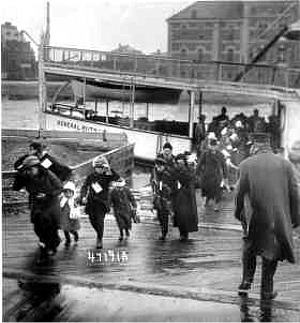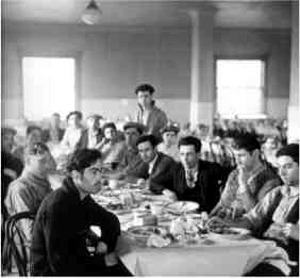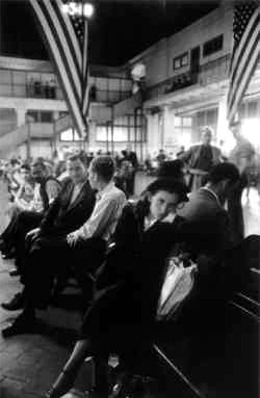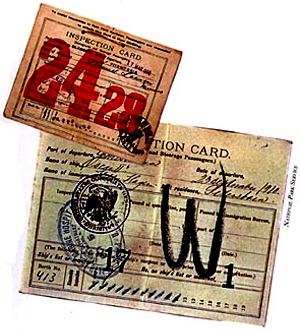
The Trip Over
The Trip Over the Atlantic
Adapted from the Virtual Immigrant at
http://imet.csus.edu/imet2/herzj/websites/virtualimmigrant/ellismain.htm
Your journey begins in a year between 1910 and 1923. You are just a teenager and like so many of your Russian neighbors, you and your family have sold most of their possessions to pay for passage and papers needed to immigrate to America. Brave, but still afraid of your unfamiliar destination, you spend endless hours and days on a passenger ship that is old and slow. You have been sailing to America on a ship for 3 long weeks. You don't sleep well, you are hungry and very dirty. You are not sure why you had to leave your home and friends. |
|
When everyone comes to the main deck for fresh air, there is little room to move. The ship moves slowly and the constant motion is sickening. The ship is packed with first class, second class and the lowest class, steerage passengers. Like most immigrants your family cannot afford good passage, so you choose to spend most of your time on the crowded deck instead of below where it is dark and cold and hard to sleep. You feel alone because it is hard to trust the people you don't know.
"And I slept... A sleep like that of an immigrant: One eye sleeps, so that another eye wakes up..." Mahmoud Darwish |
|
"Most of the trip you are ill. You remember a passenger saying, "Oh God, I was sick. Everybody was sick. I don't even want to remember anything about that old boat. One night I prayed to God that it would go down because the waves were washing over it. I was that sick, I didn't care if it went down or not. And everybody else was the same way." Bertha Devlin, an Irish immigrant in 1923 |
|
After what seems like forever to you, your destination is in site. Ellis Island. Ellis Island sits just off the coast of New York. The buildings are full of immigrants. They are the entry point for all European citizens coming to America. It is the last part of your long journey and the beginning of a new life. |
|
"You were put on a barge, jammed in so tight that you couldn't turn 'round, there were so many, you see, and the stench was terrible. And when we got to Ellis Island, they put the gangplank down, and there was a man at the foot, and he was shouting, at the top of his voice, "Put your luggage here, drop your luggage here. Men this way. Women and children this way." Dad looked at us and said, ", we'll meet you back here at this mound of luggage and hope we find it again and see you later."
|
|
You are taken to a large room, alone and away from your family. You are asked to do some math, to count backwards from 20 and to add numbers. You have to place pegs in the right shaped holes. If someone couldn't do it, they put an X on their back with chalk and they had to be sent for another test. You noticed some people failed the tests because they couldn't understand the directions that were given to them in English. You don't know much English yourself. You are scared you will fail. |
|
After the math questions, you wait for a medical inspection. The inspectors are looking at all the immigrants for diseases and infections. They asked if you were sick on the way over. You are scared to say yes, so you tell the doctor that everything is fine, hoping the truth is not evident. You have heard that some people are not allowed to enter America because they are not well. Some have infections caught on the long, dirty trip. Others bring with them diseases from their homeland. They may be sent back to their country. |
|
The inspection is over. Next you are asked to go to the men's dining area where you are fed. Looking around you notice some of the men were passengers on your boat, but most are complete strangers, traveling from many different countries and and speaking different languages. You must sit and wait for your family. Waiting is what you do most at Ellis Island. |
|
You sit some more, as do the others, just waiting, but you are not sure what you are waiting for.
|
|
Finally, the inspections and waiting are over. Your passport is stamped and you are reunited with you family. It is time to begin your assimilation into this new, American way of life. You have customs and language that are different from most of the people in America. Where is this new place to live your family has arranged? You have heard so much about this wonderful country. Your father told you the life will be better here. The opportunities are endless if one works hard. |
|









